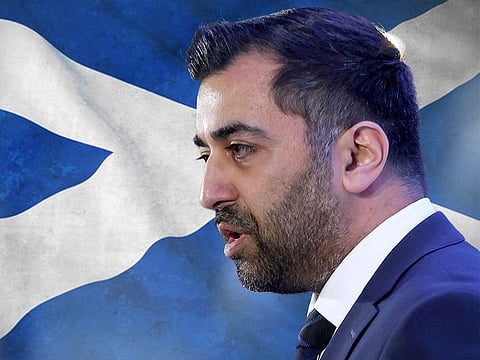From Mian Channu in Punjab to Scotland’s First Minister: The inspiring journey of Humza Yousaf
History is in the making as Scotland gets its First Minister of Pakistani heritage

Humza Yousaf’s meteoric rise within the Scottish National Party (SNP) is a landmark event in the political history of the United Kingdom. As he steps up as the next leader of the Scotland’s largest political party and party of Government, succeeding Nicola Sturgeon, Yousaf’s ascent to prominence has captured global attention.
Yousaf, 37, beat Ash Regan and Kate Forbes in a closely fought contest to become the first Muslim to lead a major UK party. He now faces a vote at the Scottish parliament before being formally confirmed as the country’s sixth First Minister.
A charismatic political figure, Yousaf’s rise over the years has been stellar, propelling him to the highest level of political office in Scotland. In his victory speech, he said he was “determined to deliver” independence for Scotland.
Yousaf is now likely to ask London for authorisation to hold a new referendum as he aims to build a “settled, sustained” majority for independence — a highly emotive issue that splits the Scottish. Overall, he is seen as a “continuity Sturgeon” candidate who shares the outgoing leader’s liberal social views.
A son of the soil
Born in Glasgow in 1985 to a Pakistani immigrant father who arrived in Scotland in the 1960s, Yousaf’s upbringing was imbued with a strong sense of community and an appreciation for multiculturalism. His father, Muzaffar Yousaf, was born in Mian Channu, Pakistani Punjab — a place named after the famous Sufi Baba Mian Channu. His mother is of Kenyan extraction.
Yousaf attended the University of Glasgow, where he studied Politics and graduated with honours. In 2011, at the young age of 25, he was elected as a Member of the Scottish Parliament (MSP) for Glasgow, becoming the youngest MSP at that time.
He has since held various prominent positions within the SNP, including minister for external affairs and international development, minister for transport and the islands, and most recently, cabinet secretary for health and social care.
As MSP for Glasgow Pollok from the SNP, Yousaf famously took his oath of allegiance in Urdu, as other members took their oaths in Doric, Gaelic and Scots as well as English.
A staunch advocate for social justice, equality, and human rights, Scotland’s new leader is known for his numerous progressive policies and initiatives, such as increasing funding for mental health services, promoting renewable energy and public transportation, and supporting refugees and asylum seekers.
He was a critical player in the successful passage of the Marriage and Civil Partnership (Scotland) Act, which legalised same-sex marriage in Scotland.
UK’s growing inclusivity
Yousaf’s rise in the SNP, as a British Pakistani, exemplifies the UK’s growing diversity and inclusivity. Most pundits see his success — a person of colour in politics — as an inspiration to other minority communities in the UK.
With both the British Prime Minister Rishi Sunak and Irish Taoiseach Leo Varadkar of Indian extraction, Yousaf’s elevation could further promote social justice and equality in the UK.
Humza Yousaf maintains a close connection with his heritage. As a minister for external affairs and international development, he played a critical role in fostering trade relations between Scotland and Pakistan, promoting collaboration in education, health, and renewable energy.
As the next leader of the SNP, Yousaf’s potential impact on the UK’s political landscape could be significant. He could usher in a new era of inclusivity and diversity within the party and the broader UK political landscape.
The young leader must, however, look over the shoulder to keep in check the infighting in SNP — ironically a party known for its discipline and loyalty. Yousaf also needs to improve the lives of the marginalised and reach out to all stakeholders to keep his country's political polarisation at bay.
Sign up for the Daily Briefing
Get the latest news and updates straight to your inbox


